What is an RC (Registration Certificate)?
The Registration Certificate, commonly called the RC, is an official document issued by the Regional Transport Office (RTO) that proves your vehicle is registered and legally allowed to be driven on Indian roads. It contains important details like the vehicle’s registration number, owner’s name, vehicle make and model, engine number, chassis number, and more.
Think of the RC as your vehicle’s identity card. Without a valid RC, your vehicle is technically illegal, and you risk fines or confiscation if caught by authorities. Keeping your RC renewed ensures your vehicle stays compliant with the law.
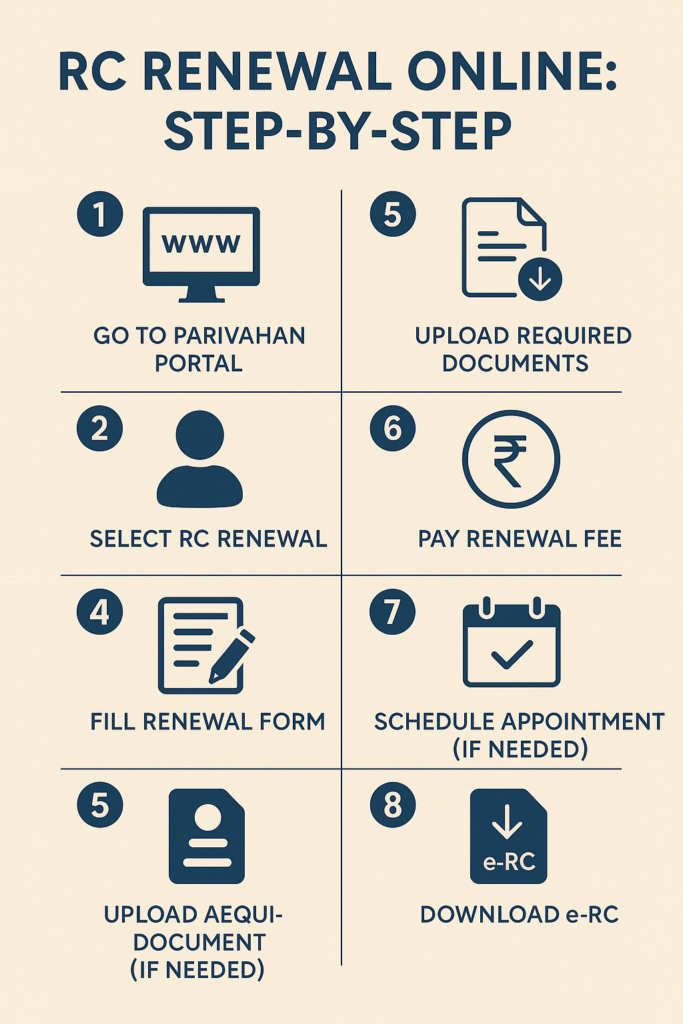
Why Is RC Renewal Important?
Renewing your vehicle’s RC is not just a formality—it’s a legal requirement under the Motor Vehicles Act. When your RC expires, your vehicle is no longer legally registered, which means:
- You can be fined or penalized by traffic authorities.
- Your vehicle insurance may become invalid, putting you at financial risk in case of accidents.
- You may face problems during resale or transfer of ownership.
- You won’t be able to get permits or other official documents without a valid RC.
Renewal keeps your vehicle’s registration active and your ownership officially recognized. It also ensures all vehicle details on record are up to date, helping prevent legal troubles down the road.
When Do You Need to Renew Your RC?
In India, the initial registration certificate (RC) for a new vehicle is typically valid for 15 years from the date of registration. After this period, you must renew the RC to continue legally driving your vehicle.
Some states may have different rules, but generally:
- For private vehicles: Renewal is required every 15 years.
- For commercial vehicles: Renewal is usually required every 5 years due to higher usage and stricter regulations.
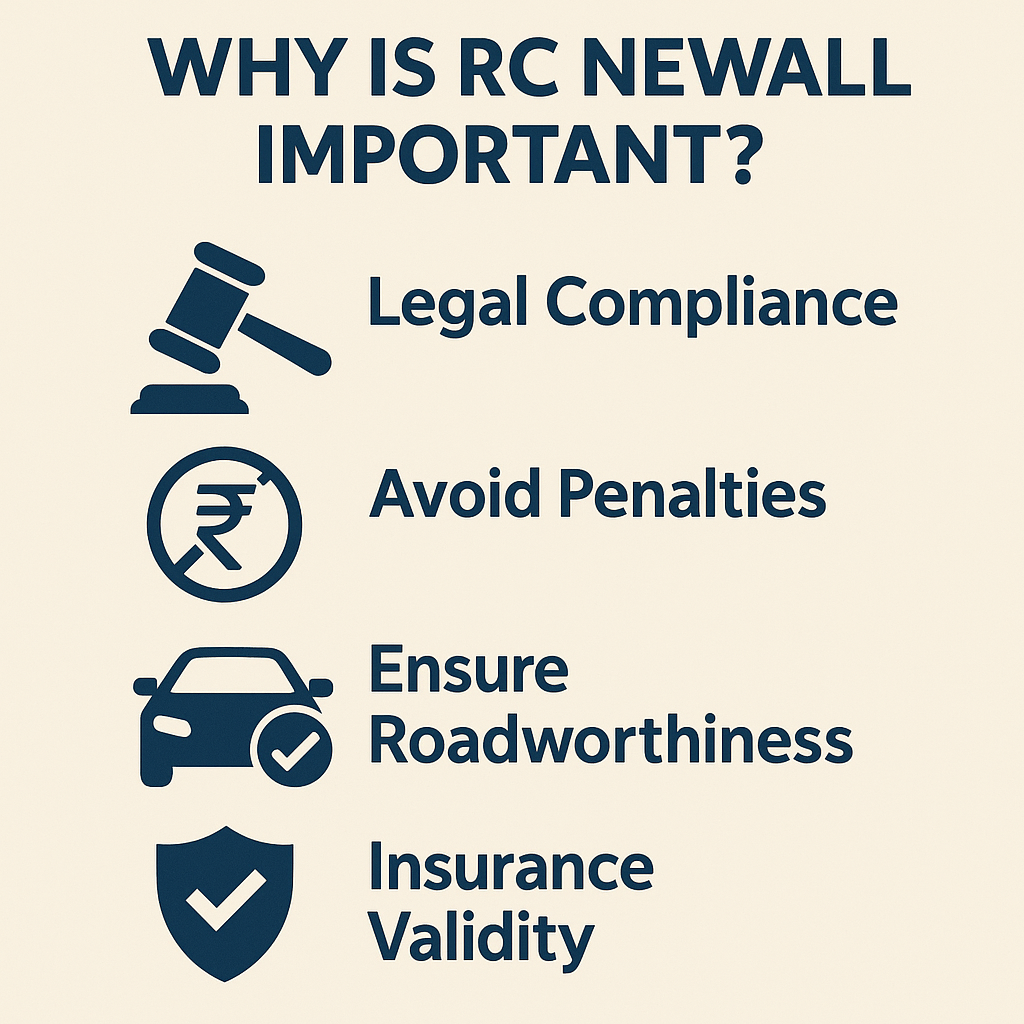
It’s important to renew your RC before it expires to avoid penalties and legal hassles. You can start Renewing your vehicle’s registration certificate online is convenient and saves you multiple trips to the RTO. Follow these steps:
How to Renew Your RC Online: Step-by-Step Guide
- Visit the Parivahan Sewa Portal: Go to parivahan.gov.in, the official transport department website.
- Register or Log In: Create an account if you don’t have one or log in with your existing credentials.
- Select ‘Online Services’: Choose ‘Vehicle Related Services’ from the menu.
- Enter Your Vehicle Details: Fill in your vehicle registration number and other requested details.
- Choose ‘RC Renewal’: Select the RC renewal option for your vehicle.
- Upload Required Documents: Upload scanned copies of necessary documents like your current RC, insurance, pollution certificate, and address proof.
- Pay the Renewal Fee: Pay the applicable fee online using net banking, credit/debit cards, or UPI.
- Book a Vehicle Inspection (if required): Some states require your vehicle to pass an inspection before renewal approval.
- Submit Application: Review all details carefully and submit your renewal application.
- Track Application Status: Use the portal to track your renewal application until the updated RC is issued.
- Download the Renewed RC: Once approved, download the renewed RC or collect the physical copy as instructed.
The renewal process a few months prior to the expiry date.
Documents Required for RC Renewal
To renew your vehicle’s registration certificate smoothly, keep these documents ready:
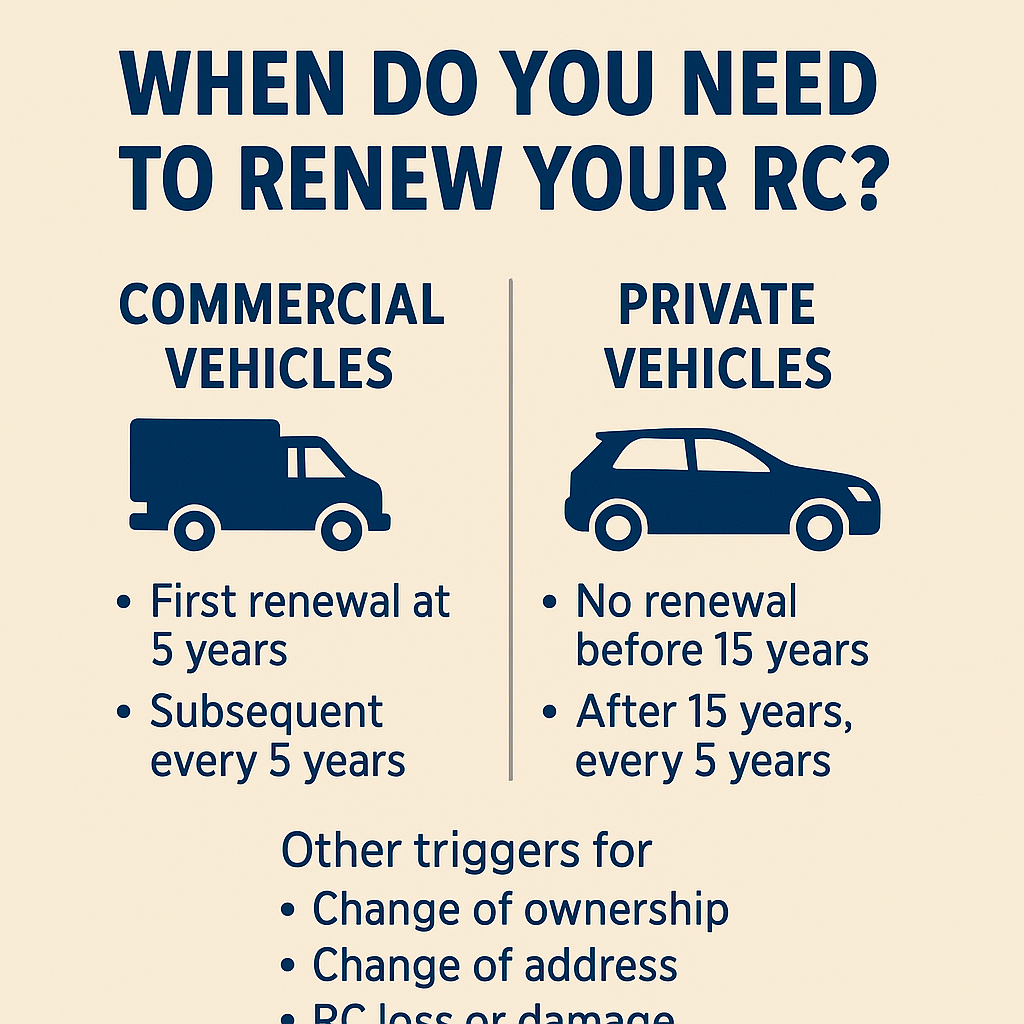
- Existing Registration Certificate (RC): Your current vehicle registration proof.
- Insurance Certificate: Valid insurance policy for the vehicle.
- Pollution Under Control (PUC) Certificate: Proof that your vehicle meets pollution norms.
- Address Proof: Aadhaar card, passport, voter ID, or utility bills.
- Identity Proof: Aadhaar, PAN card, passport, or voter ID of the owner.
- Form 26: Application form for RC renewal, available online or at the RTO.
- Vehicle Fitness Certificate: For commercial vehicles or vehicles older than 15 years, a valid fitness certificate is required.
- No Objection Certificate (NOC): If applicable, when changing the address or state of registration
How to Renew Your RC Offline
If you prefer the traditional way or face issues with online renewal, you can renew your RC offline by visiting your local RTO. Here’s how:
- Visit the RTO Office: Go to the Regional Transport Office where your vehicle is registered.
- Collect the Application Form: Ask for Form 26 (Application for Renewal of Registration).
- Fill the Form: Complete the form with accurate vehicle and owner details.
- Attach Required Documents: Include copies of your current RC, insurance, PUC certificate, address proof, and any other required papers.
- Pay the Renewal Fee: Make the payment at the RTO counter via cash, demand draft, or as per RTO guidelines.
- Get Vehicle Inspection: Your vehicle may be inspected by RTO officials as part of the renewal process.
- Submit the Application: Hand over the form and documents to the RTO clerk.
- Receive Acknowledgment: Get an acknowledgment receipt for your application.
- Collect Renewed RC: Once processed, you’ll be notified to collect your renewed registration certificate.
RC Renewal Fees
The fees for renewing your vehicle’s registration certificate depend on the vehicle type and state regulations. Generally, the fee structure includes
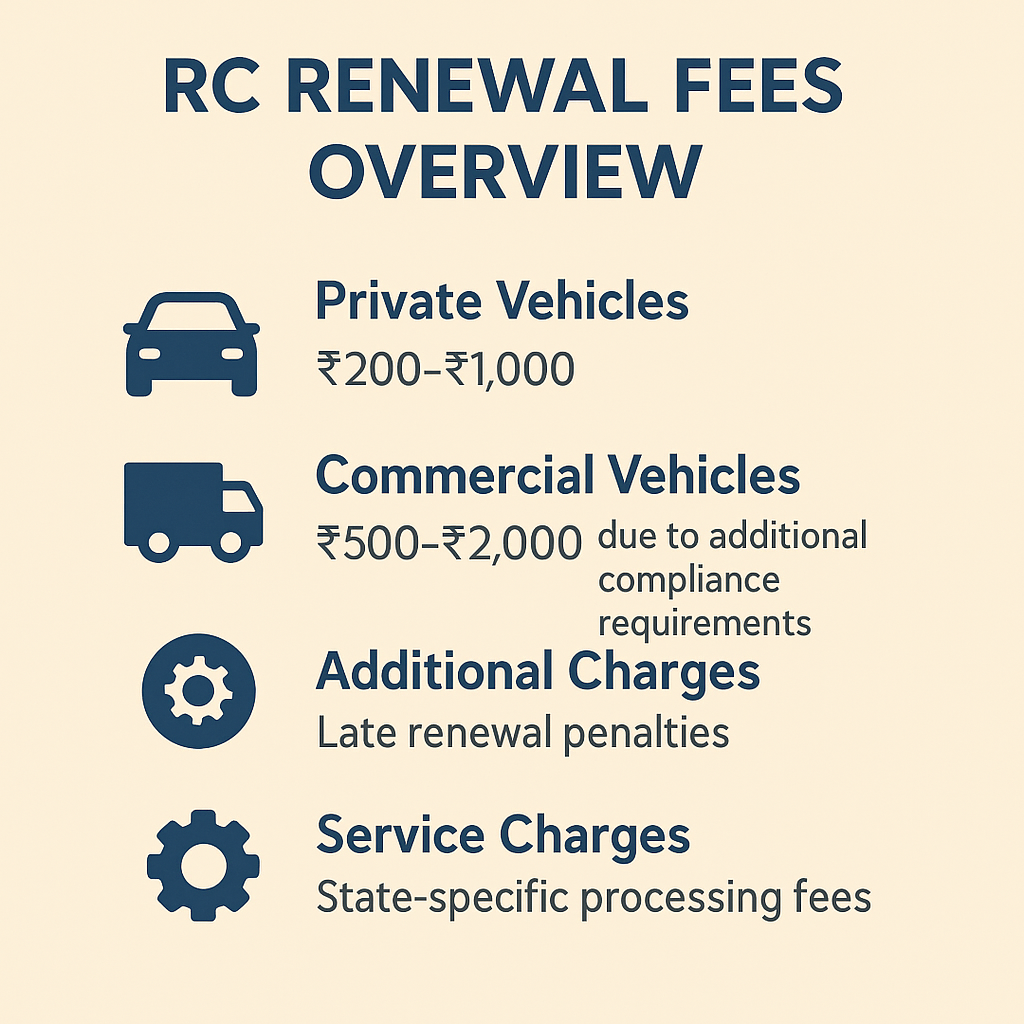
- Private Vehicles: Fees typically range from ₹200 to ₹1,000.
- Commercial Vehicles: Fees are higher, usually between ₹500 and ₹2,000, due to additional compliance requirements.
- Additional Charges: Late renewal penalties may apply if you miss the renewal deadline.
- Service Charges: Some states may add service or processing fees for online applications.
Always check the official Parivahan portal or your local RTO website for the most accurate and updated fee details.
Common Issues During RC Renewal and How to Avoid Them
Renewing your RC can sometimes get tricky. Here’s how to avoid common problems:
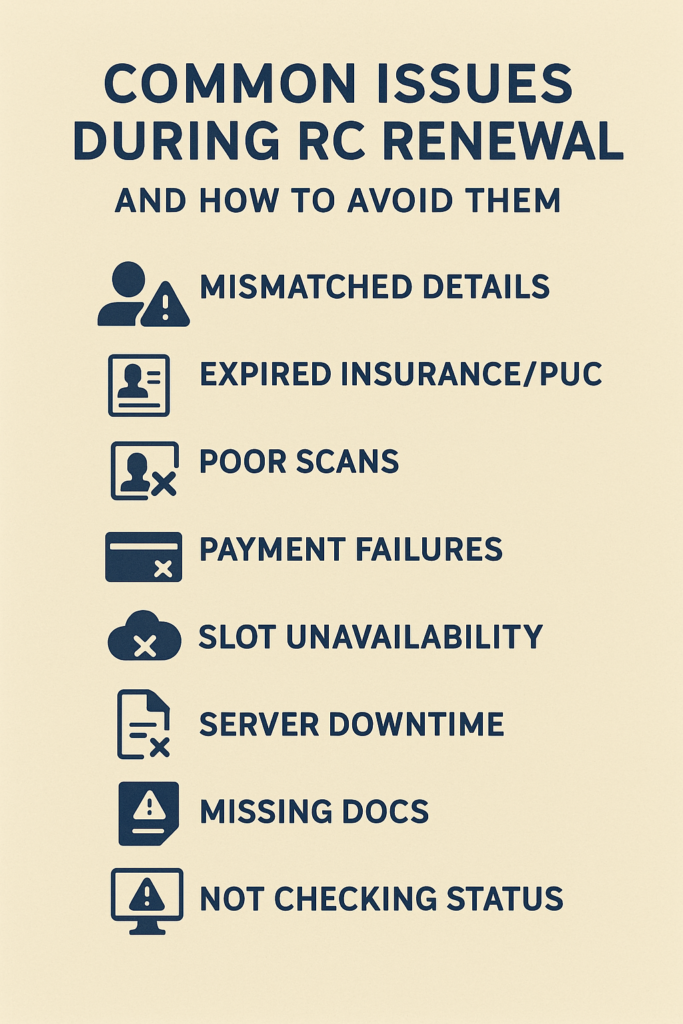
- Incomplete Documents: Ensure all required documents are correctly filled and uploaded/scanned.
- Incorrect Vehicle Details: Double-check your vehicle’s registration number and owner info.
- Missed Deadlines: Renew your RC before it expires to avoid penalties.
- Vehicle Inspection Failures: Make sure your vehicle is in good condition if inspection is required.
- Payment Failures: Use secure and official payment methods to avoid transaction errors.
If you face issues, contact your local RTO or use the online helpdesk on the Parivahan portal for support.
How to Check Your RC Renewal Status Online
Once you’ve applied for RC renewal, tracking your application is easy:
- Visit the Parivahan Sewa Portal.
- Log in with your credentials.
- Go to the ‘Status’ or ‘Check Application Status’ section.
- Enter your application number or vehicle registration number.
- View the current status of your renewal process.
This feature keeps you informed and helps plan your next steps accordingly.
